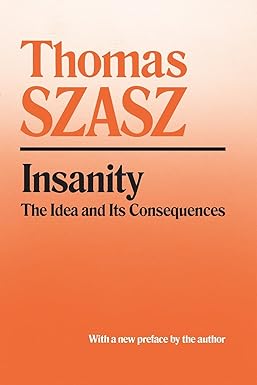
In a Substack post, Bryan Caplan shared mail from an anonymous reader, who called this Thomas Szasz book "his best book overall". I noted that it was owned by the University Near Here Library, and they haven't revoked my borrowing privileges yet, so I grabbed it.
It is Szasz's full-throated explication and defense of his view that mental illness is a metaphor. Excepting certain obvious brain malfunctions, like Alzheimer's, there are no physical "lesions" associated with mental illness.
Metaphors are fine, as far as they go. But the mainstream psychiatric community takes this one way too far, using it to absolve evildoers of responsibility for their misdeeds, and to coerce people with unusual beliefs and behavior. (And also, not coincidentally, to make a lot of money off the misguided concept.)
I'm not totally convinced by Szasz, but he makes some excellent points, and he dragged my skepticism meter about "mental illness" up by more than a few notches.
One of his more telling arguments: it's alleged that when mentally ill people perform crimes (murder, arson, assault, theft, etc.) thay are acting under the compulsion of their illness; they aren't responsible, and don't deserve criminal punishment. Szasz notes that the actions that mental illness supposedly compels are uniformly bad; nobody ever claims that mental illness compelled people to perform acts of saintliness, generosity, tolerance, etc.
And that's darn peculiar. Does "mental illness" have some sort of built-in compass about human morality, causing it to work in only one direction? That seems incoherent and unlikely on its face. Actual physical illnesses seem to be morally neutral.
Szasz doesn't mention so-called "hate crimes", but this related observation kept coming to my mind while reading: If you've misbehaved illegally, and the authorities think you did so because you had "hatred" as an underlying motive, that's not considered "mental illness": that's your fault, your responsibility, and it may bring you more years in prison.
Does that seem conveniently arbitrary to you, as it does me?
Another drive-by point: is pregnancy per se an illness? Of course not! Ah, unless it's an unwanted pregnancy: then it's a mental illness, and the only cure is abortion, always euphemized as "reproductive care".
This book is, in part, just one side in a slow-motion decades-long debate between Szasz and his critics. Caution is warranted when reading only one side. Szasz is occasionally strident, occasionally sarcastic, and that may be understandable, but my own tastes are for something more measured.
I will point out one place where I think he badly stumbles: in drawing his own parallel between psychiatry and slavery, he makes much of the Constitution's famed three-fifths compromise, calling it "a remarkable legal fiction created to legitimize a peculiar human institution".
And (sorry Tom) it just wasn't that simple: it was the southern slaveholding states that wanted to count their (non-voting) enslaved populations as much as possible for purposes of increased Congressional representation. (And also, to neglect them if it came to "direct taxation".)
![[The Blogger and His Dog]](/ps/images/me_with_barney.jpg)



